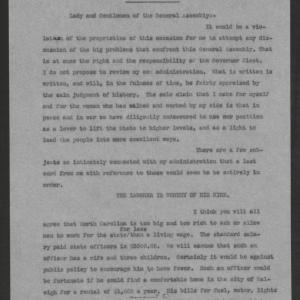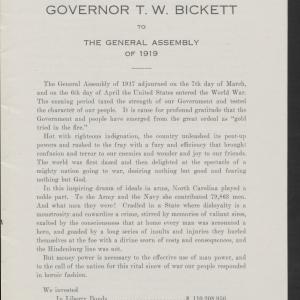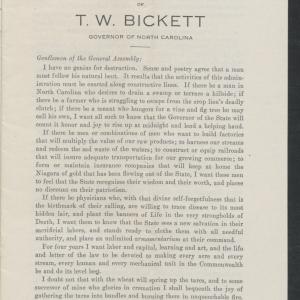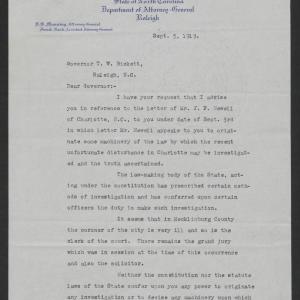- Transcription
Third Message of Governor T. W. Bickett
To
The Special Session of the General Assembly of 1920.
Aug 18, 1920
Gentlemen of the General Assembly:-
“The laborer is worthy of his hire.” This divine law of compensation applies to those who labor for the state as well as to those who labor for private individuals. The public servant is entitled to a living wage. In North Carolina he has not been receiving such a wage during the last two years but has been daily
“Doomed to that sorest task of man alive,
To make three guineas do the work of five.”
Such a policy is as unwise as it is unjust. It is simply impossible for a public servant to work with maximum efficiency when his mind is constantly disturbed and distressed by the struggle to “make buckle and tongue meet.”
I believe in the most careful expenditure of the public funds. In public and in private life extravagance is folly and wasted is a crime, but fair wages for honest work is the essence of economy.
Therefore I make the following recommendations:-
1. That the Committee on Public Buildings and Grounds be authorized to equalize and adjust the wages of all janitors, watchmen and care takers of public buildings and grounds and allow such increases as may be found to be necessary and just, provided that the maximum wage paid shall not exceed $21.00 per week.
2. That the salary of the keeper of Public Buildings and Grounds be increased from $100 per month to $150 per month.
3. That the Governor and Council of State be authorized to equalize and adjust the salaries of clerks and stenographers in the several state departments and allow such increases as may be necessary and just, provided that the maximum salary allowed shall not exceed $150 per month. I deem it my duty to the State to say that it is simply impossible to retain the present efficient clerks and stenographers unless this adjustment is authorized.
4. That the Committee on Salaries and Fees take under consideration the salaries paid clerks in the several departments whose present salaries exceed $150 per month, and recommend such increases as they may find wise and just.
5. That the salaries of all the heads of the State Departments, the Justices of the Supreme Court, the Judges of the Superior Court, the Adjutant General and the Secretary of the State Board of Health be very substantially increased. I speak with rigid accuracy and from a most intimate knowledge of the facts when I say it is simply impossible for these officials to live decently on the salaries they now receive.
The utmost candor compels me to add, that while the salary of the Governor is certainly none too large, it is out of proportion to the salaries paid the other officials. The Governor can live on his salary, for in addition to the money paid him, he is given a furnished house and supplied with water, fuel, lights and servants. A small increase in the allowance made for servants would be proper, but this is a detail that can well wait.
The items above named would more than absorb half the salary paid any regular state official.
I think the increases made in the salaries of state officials should be made to begin December 30th, 1920, as the constitutional officers can receive no increase prior to that time.
I think that the increases allowed to clerks and stenographers should be made retroactive, and to begin Jan. 1, 1920. The State is finding it increasingly difficult to retain in its employ efficient help as private individuals and corporations are everywhere offering larger salaries than the state pays.
This August 18, 1920.






